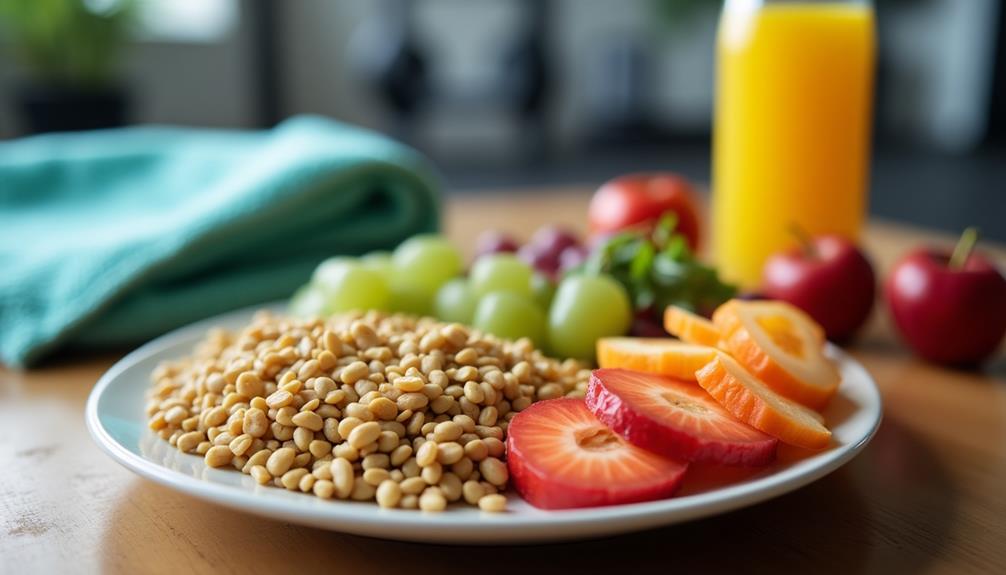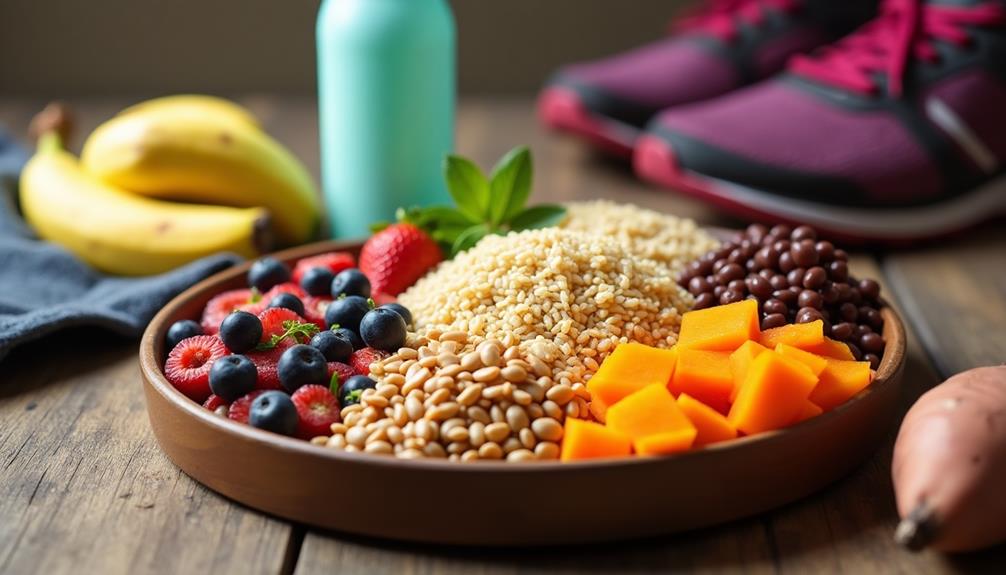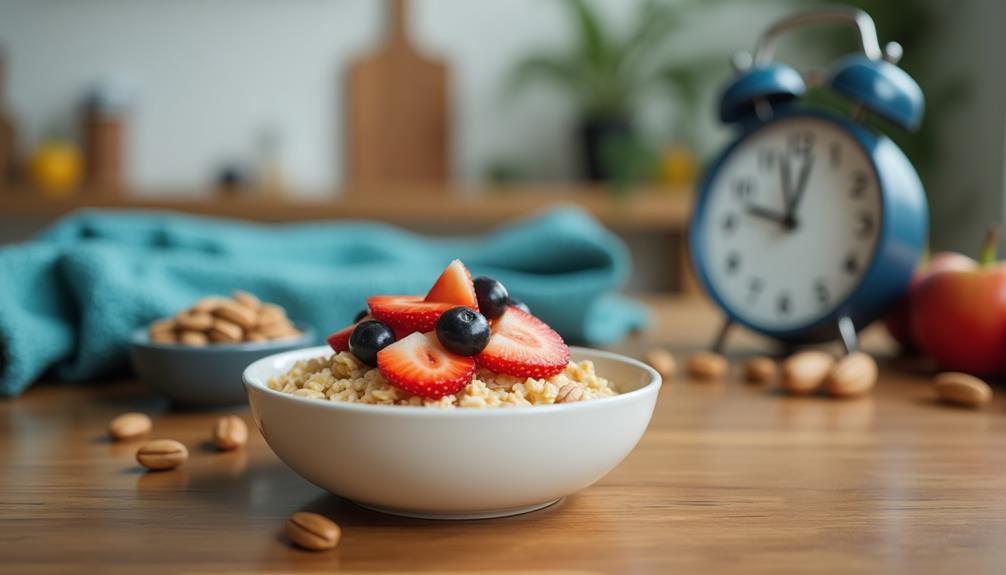Post-workout carb replenishment is crucial for your recovery. Carbs restore glycogen levels and provide energy for your next workout. Focus on easily digestible sources like bananas, whole grains, and starchy vegetables right after exercising. Aim for a 3:1 ratio of carbs to protein to support muscle repair and reduce soreness; for example, a protein shake with a banana works well. Don't forget hydration—drink water immediately and consider electrolyte drinks to replenish lost minerals. Staying hydrated and timing your carb intake effectively enhances recovery, ensuring you're ready to perform again soon. There's more to optimizing your recovery journey.
Core Insights
- Consume easily digestible carbohydrates immediately after workouts to quickly replenish glycogen stores and enhance muscle recovery.
- Incorporate whole grains, fruits, starchy vegetables, and legumes into your post-workout meals for effective carbohydrate replenishment.
- Aim for a 3:1 ratio of carbohydrates to protein in your recovery meal to optimize muscle repair and reduce soreness.
- Stay hydrated by drinking water and consider electrolyte beverages to restore essential minerals lost during exercise.
- Set reminders to drink water consistently throughout the day to support overall hydration and recovery.
Importance of Carbohydrates

Carbohydrates are essential for your post-workout recovery, and they play an important role in replenishing your energy stores. After an intense workout, your body needs to restore glycogen levels, and carbs are the primary source for this process. When you consume carbohydrates post-exercise, you help your muscles recover faster. This is vital, especially if you plan to train again soon. Rapid-acting carbs are particularly effective for quick energy replenishment and best recovery. Look for powders with easily digestible ingredients to maximize the benefits of your post-workout nutrition.
Additionally, carbohydrates can enhance your overall performance by reducing fatigue. They support your immune system, which can be compromised after strenuous workouts. It's important to choose the right amount of carbs based on your activity level and goals. By prioritizing carbohydrate intake post-workout, you're setting yourself up for better recovery and improved future performance.
Best Carbohydrate Sources

After understanding how essential carbohydrates are for recovery, it's important to know where to find the most suitable sources to fuel your body. Post-workout carb powders can be an effective and convenient option for quick glycogen replenishment. However, whole food sources also offer numerous benefits.
1. Whole Grains
Select whole grains like brown rice, quinoa, and oats. They provide not only carbs but also fiber, which aids digestion.
2. Fruits
Fruits like bananas, berries, and apples are great choices. They're packed with natural sugars and vitamins, perfect for replenishing glycogen stores.
3. Starchy Vegetables
Sweet potatoes and corn are excellent starchy options. They offer complex carbs that digest slowly, providing sustained energy.
4. Legumes
Beans and lentils are fantastic sources of carbs and protein. They help with muscle recovery while keeping you full.
Incorporate these into your post-workout meals for the most suitable recovery.
Timing Your Carb Intake

Focus on easily digestible carbohydrates during this time, such as fruits, sports drinks, or rice cakes. For peak hydration and electrolyte balance, consider adding hydration powders to your post-workout drinks. These can help replenish essential minerals lost through sweat. If you're planning multiple workouts in a day, prioritize carbs immediately after each session to maintain energy levels and support recovery. By timing your carb intake effectively, you'll maximize your recovery and set yourself up for success in your next workout.
Balancing Carbs With Protein

Post-workout nutrition isn't just about carbs; balancing them with protein is key for best recovery. After exercising, your muscles need both carbohydrates and protein to repair and grow stronger. Carbs help replenish glycogen stores, while protein provides the amino acids necessary for muscle repair.
A good rule of thumb is to aim for a 3:1 ratio of carbs to protein after your workout. For example, if you consume 30 grams of carbs, complement it with about 10 grams of protein. This balance enhances recovery, reduces muscle soreness, and promotes better overall performance in your next workout.
Choose sources like a protein shake with a banana or Greek yogurt with berries. With the right balance, you'll feel ready to tackle your next training session.
Hydration and Recovery Strategies

Hydration plays a crucial role in your recovery process, directly impacting how your body repairs muscles and replenishes energy stores. Staying properly hydrated helps prevent fatigue, muscle cramps, and soreness. Here are some effective hydration strategies to enhance your recovery:
- Drink Water: Aim for at least 16-24 ounces of water immediately after your workout to replace lost fluids.
- Electrolyte Beverages: Consider drinks with electrolytes, especially after intense sessions, to restore sodium, potassium, and magnesium levels.
- Monitor Urine Color: A light yellow color indicates good hydration status, while darker shades suggest you need to drink more.
- Set Reminders: Use your phone to remind you to drink water throughout the day, making hydration a consistent habit.
Incorporating these strategies will support ideal recovery.
Frequently Asked Questions
Can I Rely Solely on Sugary Snacks for Carb Replenishment?
You can't rely solely on sugary snacks for carb replenishment. While they provide quick energy, you need a balance of complex carbs and nutrients for best recovery, muscle repair, and sustained energy throughout the day.
How Do Carbohydrates Affect Muscle Soreness After Workouts?
Imagine your muscles as a garden after a storm. Carbohydrates act like sunshine, helping them recover and flourish. They reduce soreness by replenishing glycogen stores, so you're ready to bloom again for your next workout.
Are There Any Risks of Over-Consuming Carbs Post-Workout?
Yes, over-consuming carbs post-workout can lead to excess calorie intake, potential weight gain, and insulin spikes. It's important to balance your carb intake with your workout intensity and overall dietary needs for best results.
Can I Replace Carbs With Fats for Recovery?
You might think fats can replace carbs for recovery, but they won't replenish glycogen stores effectively. Instead, prioritize carbs for faster recovery and better performance. Balance them with healthy fats for best results.
How Do Different Exercise Intensities Impact Carb Needs?
Different exercise intensities definitely impact your carb needs. The harder you train, the more glycogen you deplete, so you'll need more carbs for recovery. Lower intensity workouts require fewer carbs, but you still need some to refuel.

